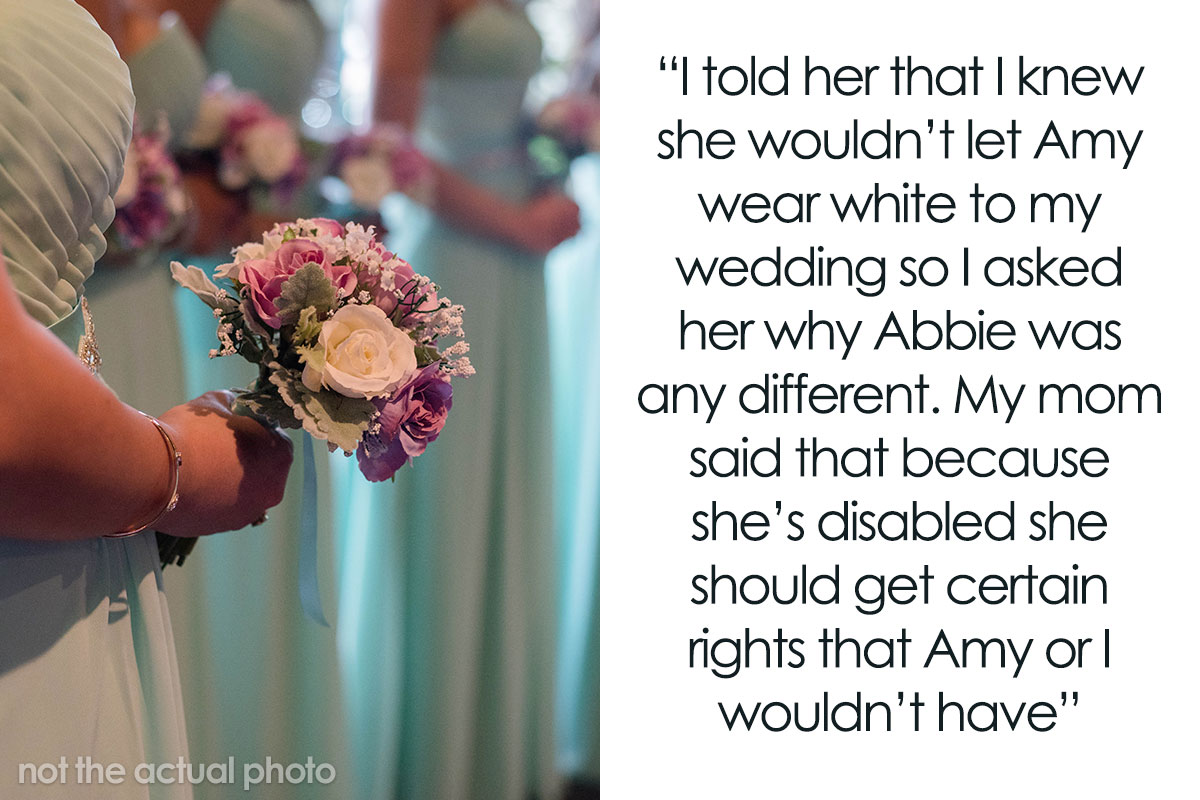
Bride-To-Be Asks If She’s A Jerk For Not Wanting Her Disabled Sister To Wear White To Her Wedding
Everyone who chooses to have a wedding wants their big day to be picture-perfect! However, for some intricate reason, not many people seem to understand the importance and decide to completely disregard it.
Take this mom, for instance; instead of helping her 23-year-old daughter make this magical day come to life, she threatens to opt out from coming because the woman is unhappy about her sister wearing a white dress.
More info: Reddit | Stefan Walters’ Instagram | Harley Therapy
This soon-to-be bride asked her bridesmaids to wear light purple on her big day
Image credits: Milan (not the actual photo)
Her mom agreed to take her disabled sister shopping, but the 17-year-old broke the dress code by buying a white dress
Image credits: Dmitry Zvolskiy (not the actual photo)
Image credits: Karolina Grabowska (not the actual photo)
Image source: u/Icy-Improvement-4258
“AITA for not wanting my disabled sister wearing white to my wedding?” – this internet user took to one of Reddit’s communities, asking its members if she’s indeed a jerk for not wanting her 17-year-old sister to wear white to her big day. The post managed to garner nearly 3K upvotes as well as 761 comments discussing the situation.
Did you know that according to Zippia’s recent piece on wedding industry statistics, “There are expected to be 2.24 million weddings in the United States throughout 2023”?
The wedding date, guest list, venue, officiant, theme, attire, rings, invitations, catering, cake, photography and videography, music, decor, transportation, hair and makeup, seating plan, rehearsal dinner, bridal shower and bachelor party, vows and speeches – there are a gazillion things that need thorough planning.
But here’s the thing – there’s only so much stress a human being can take. I mean, especially if you’re the center of the event!
White wedding dresses have been a go-to choice for many brides; essentially, it was sort of a symbol of purity and innocence, but that’s outdated, and ever since, the color has stuck around for, I guess, aesthetic purposes or tradition.
Usually, guests understand the impact and refrain from wearing the color (unless stated otherwise); however, it’s fair to say that the majority of you have heard a bunch of stories about big days going south due to someone trying to steal the bride’s limelight, be it intentional or not, and opting to wear white.
Jealousy, envy, attention-seeking, intent to offend, provocation – there’s no one-size-fits-all answer as to why someone would want to, but you might want to pay closer attention to your guest list and limit it to people who truly care about you.
The problem is, though, sometimes the so-called traitors end up being your own flesh and blood.
When confronted, the mom issued the bride an ultimatum and threatened to skip the wedding
Image credits: Curtis Adams (not the actual photo)
Now, in order to gain a more professional understanding of the situation, Bored Panda got in touch with Stefan Walters, a certified Brainspotting therapist and systemic family therapist based in London, UK.
First, we asked Stefan what some strategies are for addressing the needs and preferences of individuals with special needs in family events like weddings: “As stated, the bride’s disabled sister has ‘special’ needs due to her disability, whereas the bride herself may feel that her own needs trump these, due to the wedding being her ‘special’ day. It is important that both of these perspectives are honored.”
“Abbie’s needs and preferences will be important to her so that she can feel comfortable on the big day and make sure it goes smoothly. However, these may not necessarily align with her sister’s ideas of her dream wedding. They will both need to work together on this. Abbie’s needs and preferences are not by her choice, and may not be flexible, whereas the bride’s needs may be. We will need to ensure that both parties feel heard and validated.”
“The struggle in this situation stems from trying to balance out each person’s needs. There is no right or wrong answer here. This is more about how the sisters manage their relationship and attempt to reach a compromise together, in which they will both feel validated and respected. This has the potential to be a special day for both of them, and for the whole family, and it would be a huge shame if this was ruined because they could not manage their dilemma.”
“I would encourage them both to take turns engaging in a reflective dialogue – perhaps with a family therapist present to mediate – whereby they simply mirror and validate each other’s emotions, until they feel understood. They can then put their own perspectives forward. The bride can let her sister know how difficult it must feel to be in turmoil, stuck between accommodating her disabled sister’s needs and fulfilling her own vision of the dream wedding.”
“And likewise, Abbie can let her know how difficult it must be to advocate for her own special needs, while also wanting to comply with her sister’s wishes for her special day. If they can both hear each other out and work to understand these positions, there is real potential for connection and unity here,” the expert responded when we pondered how the bride could potentially manage the emotional turmoil.
Last but certainly not least, Stefan added: “Although this initially seems like a unique or high-stakes scenario, at its core, it is no different from any situation where two individuals have competing needs or are struggling to see eye to eye. The challenge here is stepping into each other’s shoes, taking the time to understand each other’s feelings and perspectives, and making sure that each party feels seen and validated. We are then able to turn towards each other and connect as allies, rather than turn away and disconnect as adversaries.”
What’s your stance on this situation, though, Pandas?
Fellow online community members shared their thoughts and opinions on the situation
Image credits: Emma Bauso (not the actual photo)
124Kviews
Share on FacebookSounds like mom wants to see her youngest daughter, who will in all likelihood never get married (the post is not clear with regards to the extent of her disability, but if it is 'severe' she may not be legally able to consent), in a wedding gown , and has decided to hijack her eldest's wedding for that purpose
Exactly what I'm thinking. And to an extent, I get it. But you could have the disabled daughter wear a wedding gown and have a little photoshoot, there is no need to hijack your entire elder daughters wedding for it.
Load More Replies...I agree in the lavender pantsuit. Rules about color, ok. But rules about it having to be a dress... That's a difficult one. So offer lavender pantsuit, instead of a white dress, seems a good solution.
It is a good solution. But if the mother considers it unacceptable, go with the mother’s own solution of not attending. It’ll be something for the wedding speech at least.
Load More Replies...Sounds like mom wants to see her youngest daughter, who will in all likelihood never get married (the post is not clear with regards to the extent of her disability, but if it is 'severe' she may not be legally able to consent), in a wedding gown , and has decided to hijack her eldest's wedding for that purpose
Exactly what I'm thinking. And to an extent, I get it. But you could have the disabled daughter wear a wedding gown and have a little photoshoot, there is no need to hijack your entire elder daughters wedding for it.
Load More Replies...I agree in the lavender pantsuit. Rules about color, ok. But rules about it having to be a dress... That's a difficult one. So offer lavender pantsuit, instead of a white dress, seems a good solution.
It is a good solution. But if the mother considers it unacceptable, go with the mother’s own solution of not attending. It’ll be something for the wedding speech at least.
Load More Replies...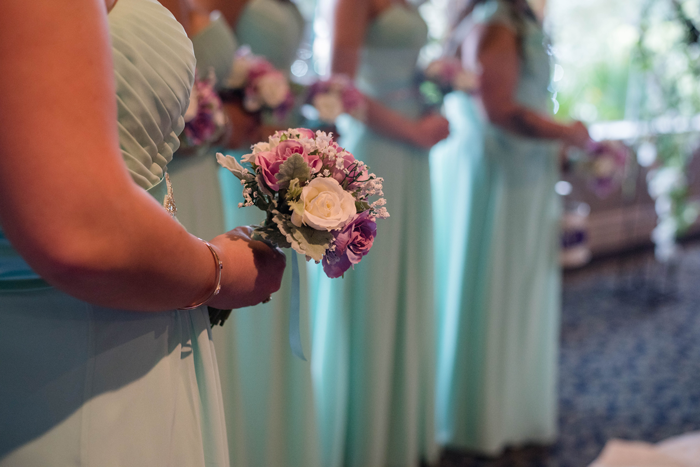
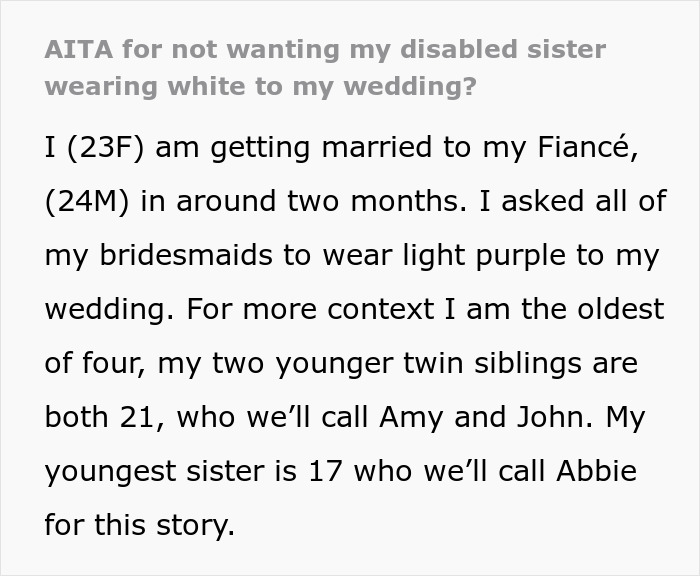
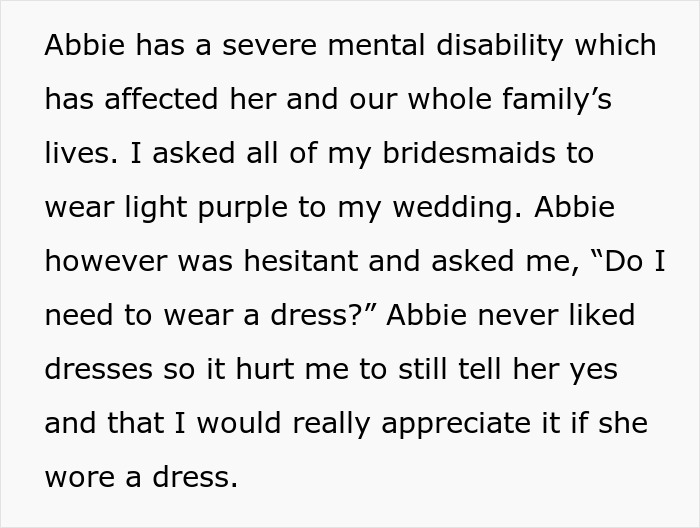
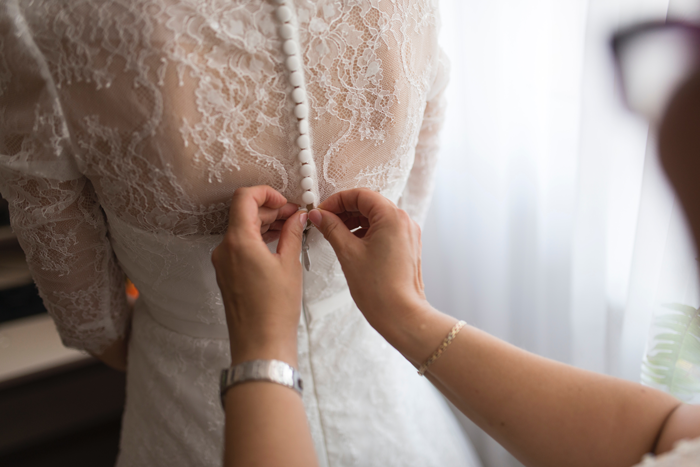
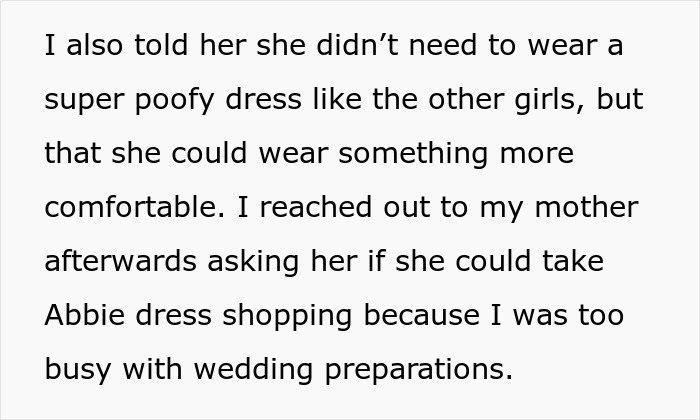
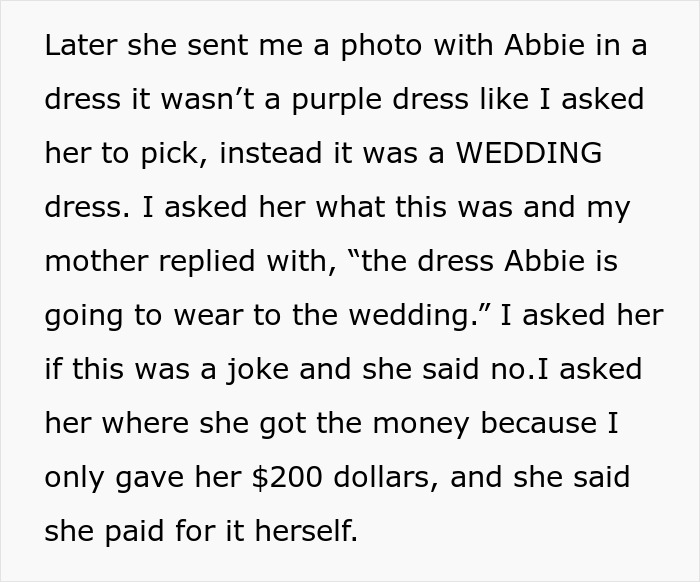
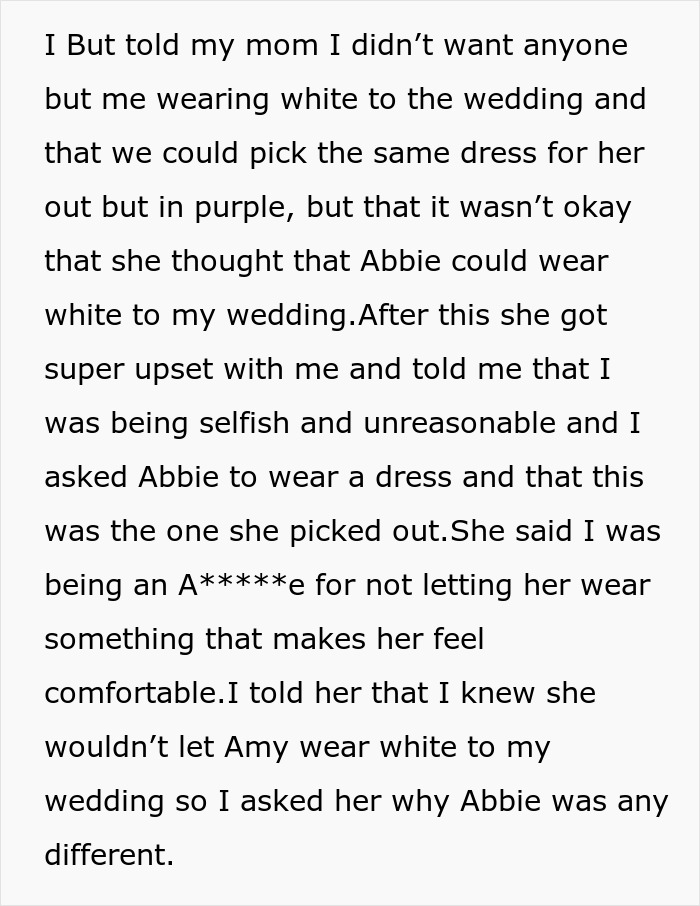

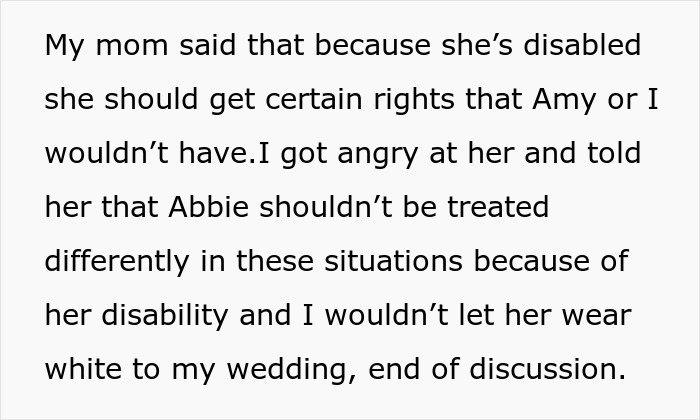
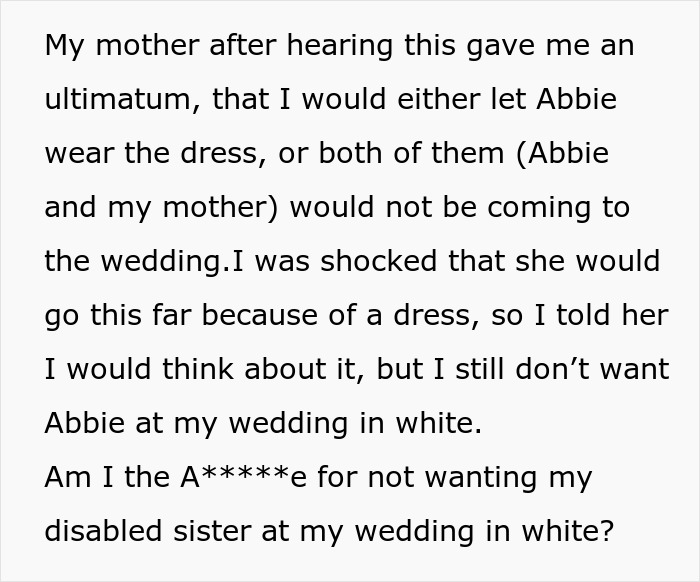
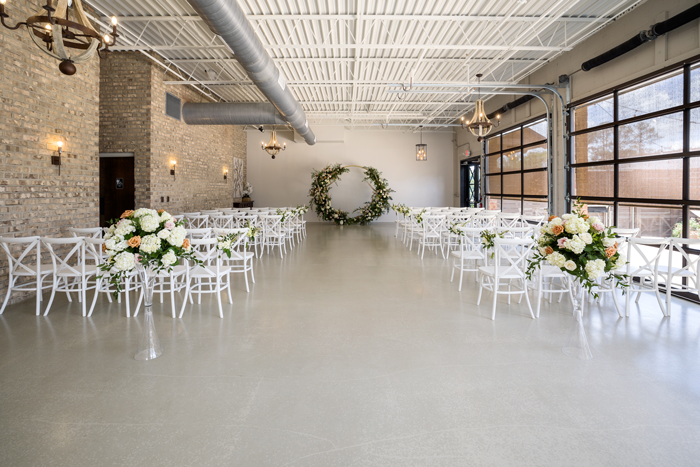
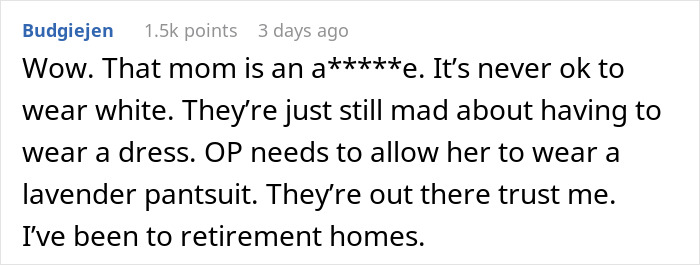

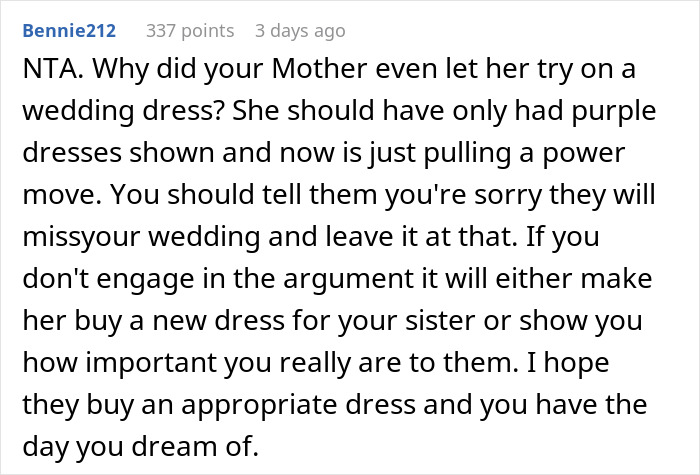

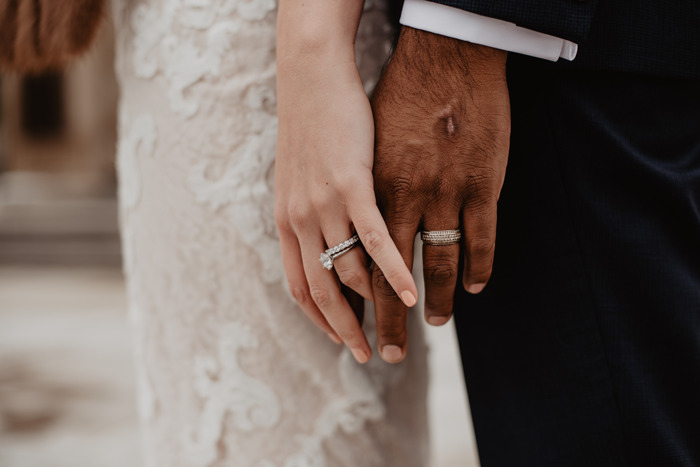
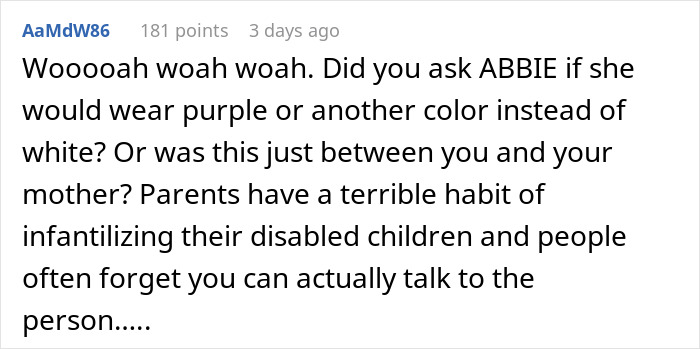
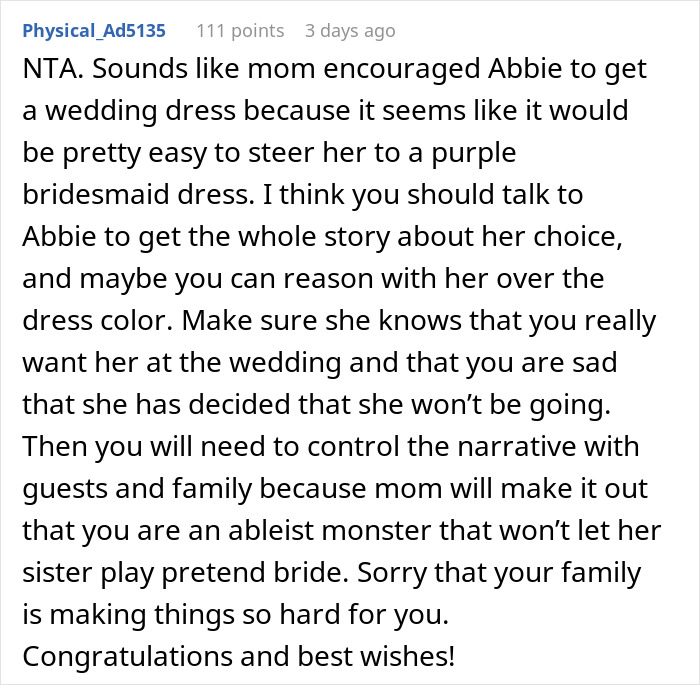
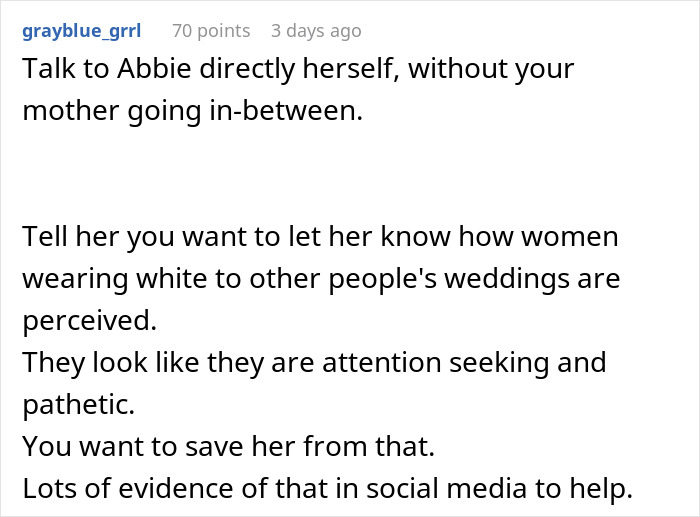




57
66